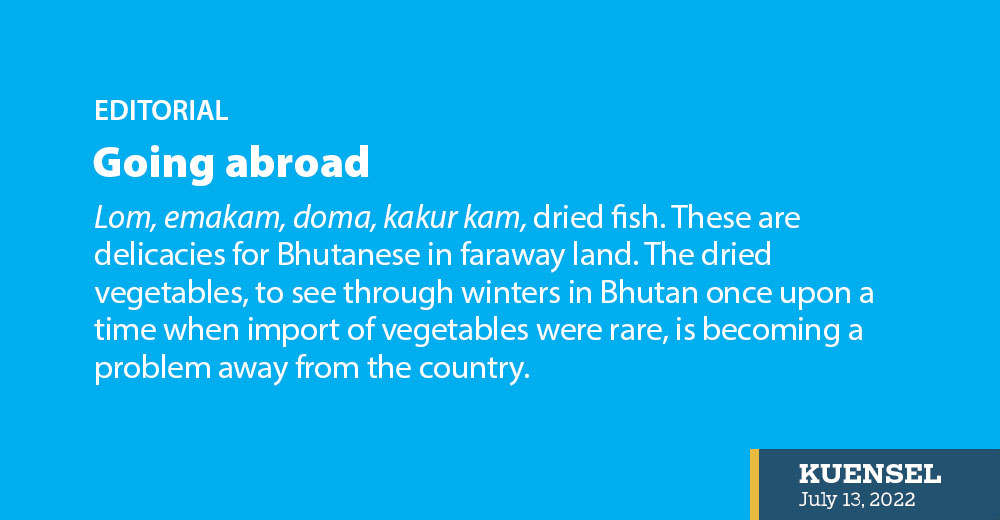Lom, emakam, doma, kakur kam, dried fish. These are delicacies for Bhutanese in faraway land. The dried vegetables, to see through winters in Bhutan once upon a time when import of vegetables were rare, is becoming a problem away from the country.
A popular television programme in Australia, Border Security – Australia’s Front Line – is a programme broadcast almost every hour to deter violators. Officials caught two Bhutanese trying to get in lom and kakur kam, which the authority okayed, but when they saw doma and pani (the leaves partially rotten), cordyceps and chugo, the Biosecurity officers had them interrogated. What happened to the couple will be seen in the following episodes, but what is apparent is that as more and more Bhutanese travel abroad to study or work, they need to be educated or briefed about regulations and laws in foreign countries.
This (the video of the couple being questioned circulating) may be the first video of Bhutanese coming into conflict with laws abroad, but it is not the first time. Biosecurity officers or homeland security coming with strange items in Bhutanese luggage, declared or not, is not new. Whether it is a piece of sikam hidden in a red rice pack or doma between clothes is a common incident at international airports.
While many will understand it as a Bhutanese taste for homegrown delicacies, our taste and cravings for strange food items could land us in trouble.
Australia, the favourite destination for Bhutanese, has strict laws when it comes to organic products. Import of seeds and other plant products into Australia is tightly regulated under the Biosecurity Act 2015. As an isolated country or a continent, this is to ensure that harmful diseases and pests are not introduced into Australia, causing significant agricultural, environmental and economic harm. The Australian government had been successful in doing that.
For instance, a long time ago, when about 22 European countries, Japan, Israel, Canada and the USA were impacted by the Bovine spongiform encephalopathy (BSE) disease, the strict border security prevented Australia from the disease. The disease is still not reported in Australia. Bhutanese taking shakam to Australia could come under strict vigilance.
Bhutanese, wherever in the world, have a craving for home food. Even if they can dry their own sikam or shakam, lom or chilies, the yearning for some home food is always there. However, this will have to change. At some point, this strange food habit is going to make it difficult for Bhutanese travelling abroad.
Today it is dry vegetables. As seen in the video, security officials were surprised to see cordyceps sinensis in the bag. As of now, Bhutanese are seen as honest and sincere people. But this will change if the increasing number of Bhutanese going abroad are seen breaching rules and laws.
There are several firms that entice Bhutanese to live and work in foreign land. It is also their responsibility to let the emigrants know the rules of the country they are heading to. Bhutanese are adventurous even if they are flying for the first time. Some are innocent and can be easily convinced to carry parcels.
At border checkpoints, not knowing what is packed in the parcel you are carrying is not a good excuse. Today it is lom or doma, it could be something more damaging tomorrow.
Correction
The video clip from the Border Security – Australia’s Front Line that is circulating on social media is a clip from 2013. It is shared recently on social media making many believe it happened recently.
Kuensel offers its sincere apologies for the mistake.


